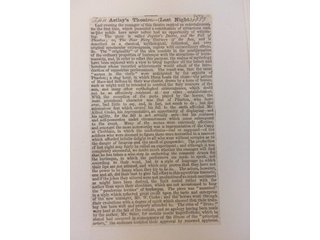Transcription
Astley’s Theatre.—(Last Night.)
Last evening the manager of this theatre essayed an entertainment for the first time, which presented a combination of attractions such as the public have never before had an opportunity of witnessing. The piece is called Jupiter’s Decree, and the Fall of Phaeton; or, The Four Fiery Coursers of the Sun, and is described as a classical, mythological, rhythmical, and very original spectacular extravaganza, replete with extraordinary effects, &c. The “originality” of the idea consists in the amalgamation of the ordinary properties of burlesque with the attractions of horsemanship, and, in order to effect this purpose, the realms of mythology have been explored with a view to bring together all the heroes and heroines whose recorded achievements would admit of the introduction of equestrian performances. The result was, that the usual “scenes in the circle” were anticipated by the exploits of Phaeton; a stag hunt, in which Diana heads the chase—the arrival of Mars and Bellona in their war chariot, drawn by a team of horses, such as mighty well be intended to outrival the fiery coursers of the sun, and many other mythological extravagances, which could not be so effectively render at any other establishment. With the exception of the parts played by the horses, the most prominent character was that of Phaeton, who however, had little to say, and, in fact, not much to do; but the miraculous feat which caused his fall to the earth afforded Mr. Alfred Cooke, his representative, an opportunity of displaying—not his agility, for the fall is not actually seen—but his coolness and self-possession under circumstances which occur subsequent to the event. Many of the scenes were extremely effective, and amongst the most noteworthy was a representation of the Camp at Chobham, in which the misfortunes—real or supposed—of the soldiers who were doomed to figure there were travestied in a manner which afforded infinite delight to all who were without scruples as to the danger of rearms and the smell of gunpowder. The production of last night may fairly be called an experiment: and although it was completely successful, we doubt much whether the manager will find that he has taken a wise step in eschewing the romantic drama for the burlesque, in which the performers are made to speak, not according to their wont, but in a style of language to which their lips are not attuned, and which only proves that they have not the power to be funny when they try to be so. The actors, however, one and all, did their best to give full effect to this equestrian travestie, and if the jokes they uttered were not productive of so much merriment as might have been desired, the fault rested rather with the author than upon their shoulders, which are not accustomed to bear the “ponderous levities” of burlesque. The piece was “mounted” in a style which reflected great credit upon the taste and enterprise of the new manager, Mr. W. Cooke; and the horses went through their evolutions with a degree of spirit which showed that their training has been well and properly attended to. The cries of “Bravo!” were loud at the fall of the curtain, and an apology having been made by the author, Mr. Suter, for certain scenic imperfections, which he stated had occurred in consequence of the illness of the “principal artiste,” the audience testified their approval by renewed applause.
